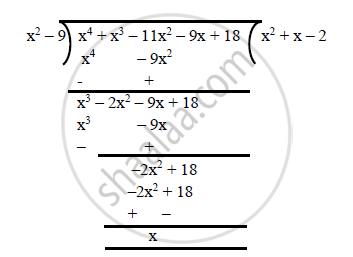Advertisements
Advertisements
प्रश्न
If 3 and –3 are two zeroes of the polynomial `(x^4 + x^3 – 11x^2 – 9x + 18)`, find all the zeroes of the given polynomial.
उत्तर
Let `x^4 + x^3 – 11x^2 – 9x + 18`
Since 3 and – 3 are the zeroes of f(x), it follows that each one of (x + 3) and (x – 3) is a factor of f(x).
Consequently, `(x – 3) (x + 3) = (x^2 – 9)` is a factor of f(x).
On dividing `f(x) by (x^2 – 9)`, we get:

`f(x) = 0 ⇒ (x^2 + x – 2) (x^2 – 9) = 0`
⇒ `(x^2 + 2x – x – 2) (x – 3) (x + 3)`
⇒ `(x – 1) (x + 2) (x – 3) (x + 3) = 0`
⇒ `x = 1 or x = -2 or x = 3 or x = -3`
Hence, all the zeroes are 1, -2, 3 and -3.
APPEARS IN
संबंधित प्रश्न
if α and β are the zeros of ax2 + bx + c, a ≠ 0 then verify the relation between zeros and its cofficients
If α and β are the zeros of a quadratic polynomial such that α + β = 24 and α − β = 8, find a quadratic polynomial having α and β as its zeros.
If If α and β are the zeros of the quadratic polynomial f(x) = x2 – 2x + 3, find a polynomial whose roots are `(alpha-1)/(alpha+1)` , `(beta-1)/(beta+1)`
Find the condition that the zeros of the polynomial f(x) = x3 + 3px2 + 3qx + r may be in A.P.
Find the quadratic polynomial, sum of whose zeroes is 8 and their product is 12. Hence, find the zeroes of the polynomial.
On dividing `3x^3 + x^2 + 2x + 5` is divided by a polynomial g(x), the quotient and remainder are (3x – 5) and (9x + 10) respectively. Find g(x).
If one of the zeroes of the cubic polynomial x3 + ax2 + bx + c is –1, then the product of the other two zeroes is ______.
Find the zeroes of the following polynomials by factorisation method and verify the relations between the zeroes and the coefficients of the polynomials:
`2x^2 + (7/2)x + 3/4`
If α and β are the zeros of a polynomial f(x) = px2 – 2x + 3p and α + β = αβ, then p is ______.
The zeroes of the polynomial p(x) = 25x2 – 49 are ______.
